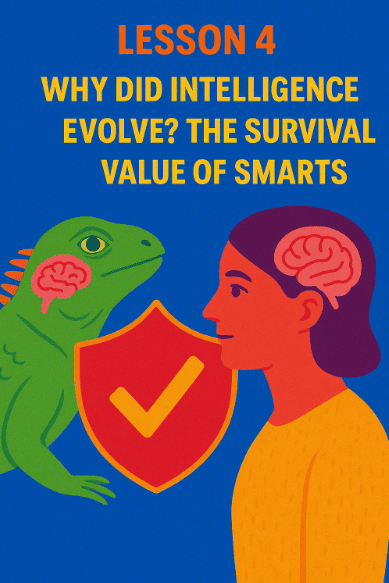
In Lesson 3, we met the primates, saw how apes developed larger brains, and followed the story of our early human ancestors. We learned that tools, social groups, and language gave humans the edge, leading to the Great Leap Forward in brain size and thinking.
Now we’ll tackle a mystery: why did evolution favor intelligence at all? After all, dinosaurs survived 150 million years without big brains. Crocodiles, sharks, and insects have barely changed in hundreds of millions of years—and they’re still around today. So why did some species take the risky path of growing huge, costly brains?
The Cost of Intelligence 🧠💰
First, let’s understand: intelligence is expensive.
-
The human brain makes up only about 2% of body weight, but it uses about 20% of the body’s energy every single day. That’s like a phone app that drains most of your battery just by running in the background.
-
Big brains take a long time to develop. Human babies are born helpless and require years of care before they can survive alone.
-
Large brains also make childbirth more dangerous, because a bigger skull has to fit through the birth canal.
So why would evolution “pay” such a high price for intelligence? There must have been incredible survival benefits.
Hypothesis 1: Intelligence for Food 🍖🌱
One idea is that intelligence evolved to solve food problems.
Animals with smarter brains could:
-
Remember where fruit trees were.
-
Crack nuts with stones.
-
Dig roots or hunt in teams.
-
Use fire to cook, unlocking more energy from food.
A smarter brain meant a fuller stomach, and survival often comes down to who eats best.
Hypothesis 2: Intelligence for Social Life 👥
The social brain hypothesis (from Lesson 3) argues that brains grew mainly to manage complex social groups.
In groups, survival depended on:
-
Forming alliances.
-
Avoiding betrayals.
-
Keeping track of relationships (“I helped you yesterday, now you help me”).
-
Understanding emotions of others.
Brains became like social computers, processing the behaviors of many group members at once. The bigger the group, the smarter the brain needed to be.
Hypothesis 3: Intelligence for Survival in Unstable Environments 🌍⚡
Another idea is that intelligence evolved because the environment kept changing.
Imagine:
-
Ice ages came and went.
-
Forests turned into grasslands.
-
Animals had to adapt to new climates, foods, and dangers.
Reflexes are great when life is predictable, but intelligence shines when life is uncertain. A flexible brain can invent new solutions when old instincts no longer work.
The Winner? A Combination 🎭
Most scientists today think no single hypothesis explains it all. Instead, intelligence evolved because of a mix of food challenges, social life, environmental changes, and even sexual selection.
Brains were like a Swiss Army knife—useful in many situations. Once brains started growing, they opened up more opportunities, and intelligence kept reinforcing itself generation after generation.
A Story: The Clever Human vs. the Strong Predator 🦁
Imagine two early humans 100,000 years ago living in Africa. A lion lurks nearby.
-
The lion is stronger, faster, and has sharp teeth. Instinct tells it to chase and kill.
-
The human is weaker, slower, and has no claws. But instead of fighting directly, the human uses intelligence: he sharpens a stick into a spear, hides behind a bush, and waits with his friends. Together, they scare off the lion and even hunt it.
The lion is powerful, but the human’s smarts beat strength.
This story shows why brains mattered: they allowed cooperation, invention, and planning—things that raw muscle alone could not achieve.
The Brain’s Superpower: Learning 🌟
Here’s the most important point:
-
Instincts are fixed—you’re born with them.
-
Intelligence lets you learn new behaviors during your lifetime.
This flexibility is priceless. If food sources disappear, or new predators arrive, a learning brain can adapt quickly. That’s why intelligent species like humans, dolphins, and crows thrive in many different environments.
Key Takeaways 🌟
-
Intelligence is costly but powerful.
-
Several theories explain its evolution: food challenges, social life, unstable environments, and sexual selection.
-
The true answer is likely a combination of all these.
-
The biggest advantage of intelligence is learning—the ability to adapt to new challenges.
-
Evolution chose brains not because they were easy, but because they were powerful survival tools.